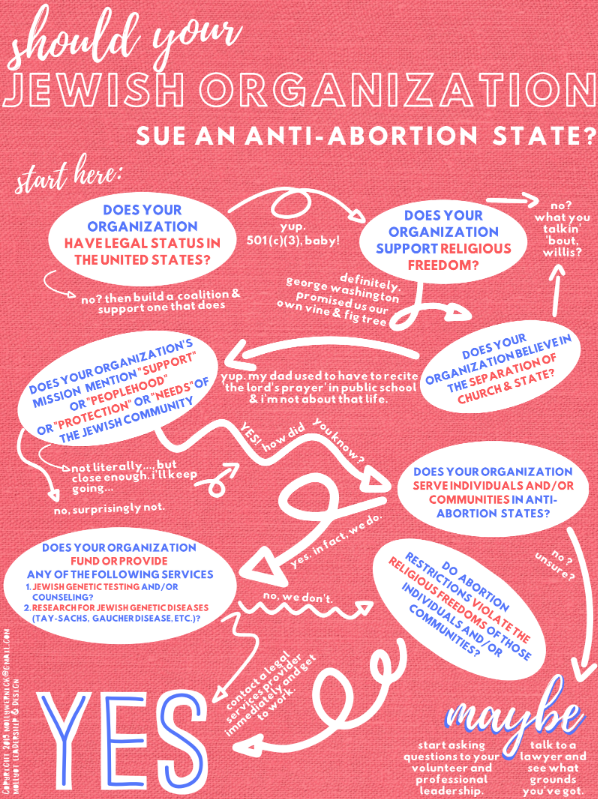September 10, 2019 by Chanel Dubofsky
Why Molly Wernick is an Advocate for the Separation of Church and State
By Chanel Dubofsky
When Justice Anthony Kennedy announced his retirement from the US Supreme Court in June 2018, fear, panic, and dread rose up in the throats of pro-choice Americans. The precarious position of Roe v. Wade, the 1973 decision protecting a person’s choice to have an abortion, was one that people had been well aware of since before the election of Donald Trump in November 2016, but Kennedy’s retirement provided the opportunity to appoint another anti-choice justice who could eviscerate Roe if and when the time came.
For Molly Wernick, who oversees Community Engagement initiatives for Habonim Dror Camp Galil in Southeastern Pennsylvania, the appointment of Brett Kavanaugh, Trump’s choice to replace Kennedy, meant the transformation of abortion debate, from “something that didn’t threaten my life and future to something that did.” Her response came in the form of an article for Medium, written the second day of Rosh Hashanah 2018, in which she wrote about learning that she and her husband were both carriers of Tay Sachs disease, an inherited, degenerative condition which leads to death in children, typically by about the age of four. In a post-Roe America, Wernick reflects, she, as a person of privilege, would be able to access an abortion, which isn’t the case for many others. As a result of the article, Wernick told Lilith, people came forward to tell their stories of abortion and miscarriage, stories they had kept secret until then, out of a sense of shame.
But there’s another element to the abortion rights conversation, and that has to do with the separation of church and state. “It’s also a slap in the face to my own religious freedom,” says Wernick. While the Christian belief that life begins at conception controls the anti-choice actions leading to abortion legislation, Wernick points out that that’s not what the Jewish view of abortion is. “For the first 40 days of gestation, a fetus is considered “mere fluid” (Talmud Yevamot 69b), and the fetus is regarded as part of the mother for the duration of the pregnancy,” wrote Rabbi Danya Ruttenberg, on Twitter in May 2019. (Read the entire thread, it’s a great 101 on Judaism and abortion.) Restricting, and attempting to ban legal abortion altogether on the basis of Christian interpretation, explicitly violates the First Amendment, which protects freedom of religion.

“Someone else’s religious doctrine is impacting my life and how I plan my family,” says Wernick “I can’t believe Jewish communities are staying silent.”
Let’s be clear: individual Jews, as well as certain Jewish organization like the National Council of Jewish Women, have spoken, and continue to, speak out against proposed bans of all abortions after six weeks of pregnancy (which are in effect total abortion bans, since many people who can get pregnant may not even know they are pregnant at six weeks), and other anti-choice legislations. Where, wonders Wernick, is the Federation movement, which was founded on the premise of protecting Jews from forces wishing to violate the separation of church and state? What can be done to stop Christian lawmakers from acting upon Jewish bodies?
Wernick has done a lot of thinking and strategizing around potential legal recourses, and she has created a graphic depicting the steps Jewish organizations can take to address this direct violation of religious freedom. For example: a court case could be brought by a Jewish organization seeking to support a member who has had their religious freedom violated by not being able to access abortion care. In order for this to happen, however, a person would have to know that her rights are being violated––so familiarize yourself with the abortion laws in your state, as well as those that dictate access to contraception. (Do you live in a place where pharmacists can refuse to fill your birth control prescription based on their religious beliefs?) One also needs to have access to a Jewish organization willing to take action, even if that means the organization may risk losing donors or congregants. Ironically, Wernick might turn out to be the ideal person to bring a case based on religious freedom, since she may one day find herself terminating a pregnancy because of Tay-Sachs. “It’s the only silver lining,” she says.
Want to take action now? Familiarize yourself with the abortion laws in your state, and what it would take to access an abortion: distance, cost, time off from work, and more. T get further acquainted with what Jewish law says about abortion, check out Danya Ruttenberg’s Twitter thread, as well as My Jewish Learning. How do your state and local representatives vote on abortion, and how will that affect how you vote? “We need to remind representatives that they actually work for us,” says Wernick. And finally, remember that change requires mobilization, so talk to your friends and family and use that collective energy to make an impact.
 Please wait...
Please wait...